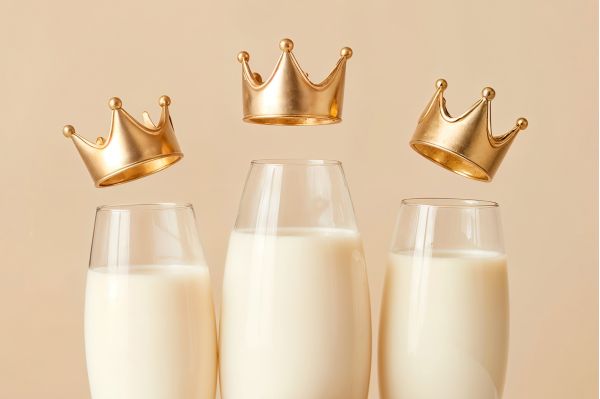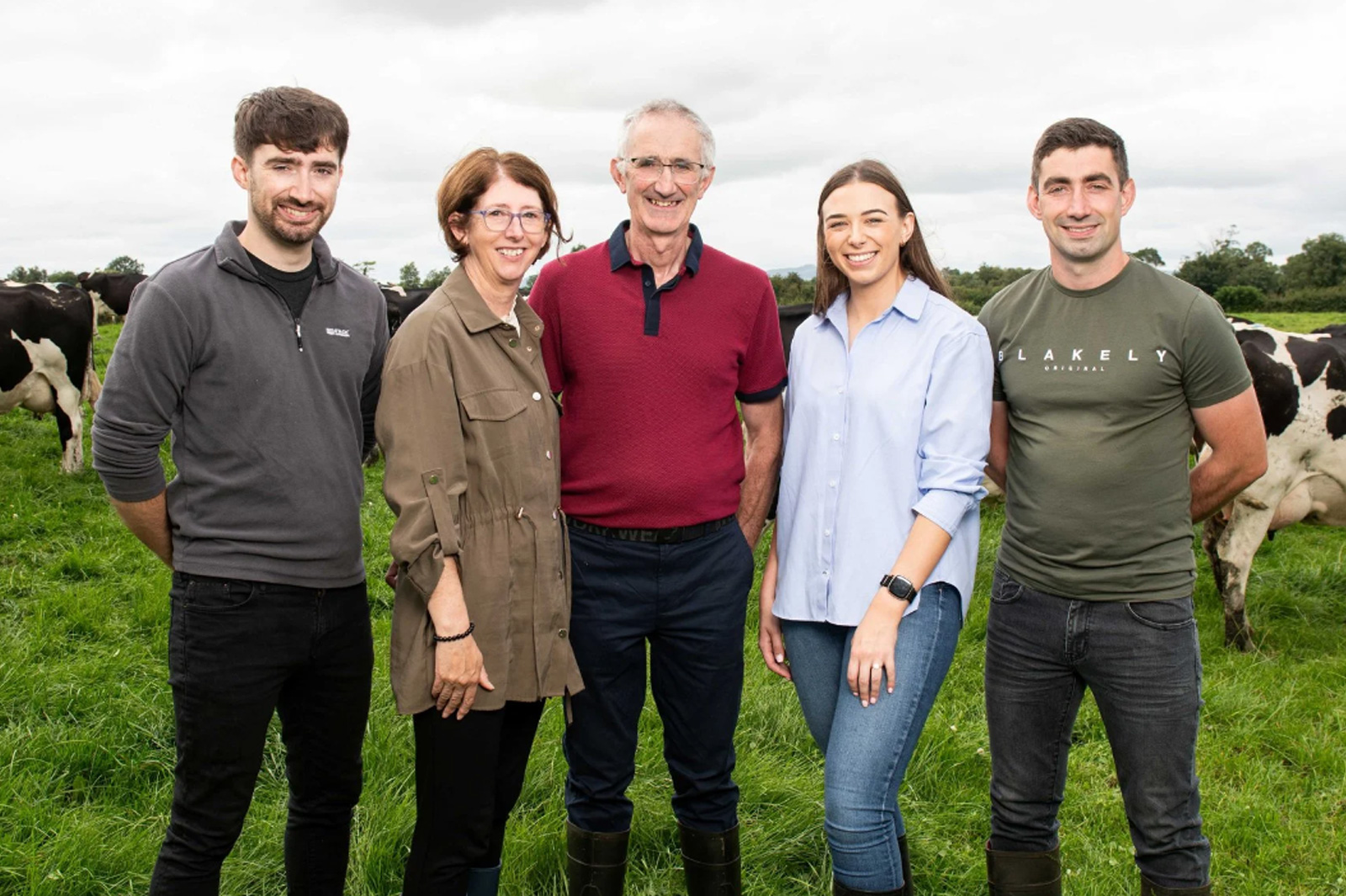Milk Oscars

The event, held last month, confirmed the dedication of Irish family farms to the production of milk to the highest global standards. This does not happen by accident, according to Emma Wall, CEO of the National Dairy Council. Emma referenced the expertise and commitment of the award-winners to continuous improvement and their ability to overcome additional challenges and responsibilities, including ever higher environmental standards, water quality, emissions, and the deployment of new technologies that transform the way they farm. She also highlighted the varied entry paths to dairying now available, including leasing and partnerships, which provide options to encourage generational renewal in the sector, and allow new entrants to access milk production opportunities.
Emma did not understate the challenges facing Irish milk producers when addressing the Quality Milk Awards winners: “Irish dairy gets knocked regularly, with often very negative commentary. While others may criticise from the outside, our producers, as seen here today, are positive and committed. They support their local economies as well as the national economy and sustain our international reputation for producing high quality milk products. What is stunning is to see the level of optimism, commitment and resilience in the face of multiple challenges, including weather, labour and land shortages, geopolitical uncertainties, tariffs and shifting consumer sentiment, changing regulations, and all the increased costs associated with milk production, as well as falling milk prices now. Yet, our farmers just get on with it.”
Another Win for Tipp
The Ryan family from Thurles were worthy winners of the overall Quality Milk Awards accolade. Tom, Mary and their son Michael produce milk for Centenary Thurles Co-op on the Maryland Farm, milking a herd of 150 cows in a spring-calving production model. A three-way partnership was formed when Michael returned home to farm after completing a degree in agriculture. The groundwork for the present-day herd had already been well laid down by Michael’s parents, with a cow breeding model based on productivity, longevity and high health traits. Annual average milk solids (MS) are 523kg/cow and the emphasis is on producing as much as possible from grazed grass. The Ryan herd is at grass for 300 days annually, with buffering of concentrates at critical stages including early lactation, low grass growth periods and late lactation.
The Pure Friesian-Holstein cross herd has an increasing EBI, currently at €245, with the Ryans incorporating sexed semen into their breeding regime. Notably, the breeding policy includes the use of TB-resistant bulls, from the locally based Dovea Centre and other AI services including Progressive Genetics and Eurogene. It is a closed herd since 2003. Having endured a wipe-out in the 1990s from brucellosis, the Ryans take every possible precaution to ensure their herd health status is safeguarded. The herd is vaccinated against blackleg, salmonella, leptospirosis and infectious bovine rhinotracheitis. Lameness is carefully managed with regular foot bathing and hoof paring as required. Additional health support protocols include pre-calving and breeding season mineral supplementation.
It hardly requires mention that milk quality standards on the Ryan farm are exemplary. TBC averages 9,000 while herd SCC is 71,000. The latest protocols to counter antimicrobial resistance have been well adopted with almost one third of the cows now receiving teat seal treatment at drying off.

The Ryan family from Thurles were worthy winners of the overall Quality Milk Awards accolade.
A Family Team Effort
Michael Ryan explained the close cooperation on the farm that delivers excellence in milk production: “All family members help out when they can, with my parents fully involved in the running of the farm.” Tom’s tentative plans to retire are dismissed as 'unlikely to happen anytime soon'.
The importance of a long grazing season is emphasised by Michael: “We are grazing for 300 days and it’s the main focus for the farm. Every day at grass reduces costs. That’s our big natural advantage in Ireland and must be utilised to the greatest extent possible. We have moved to one hundred percent Protected Urea for our nitrogen inputs and it’s working well. Last year, no matter what fertiliser was used, grass growth just didn’t happen because of weather conditions. This year has been a complete turnaround with an almost perfect grazing season. The cost saving for using protected urea compared to CAN makes it a no-brainer. We have no problems with it. We make use of red clover on a large proportion of the farm, with white clover incorporated across the remainder, apart from some peaty soils where it’s not as prevalent. Clover puts money in your pocket as well as protecting the environment, so it’s a complete positive.”
Michael attributes high milk solids and volume production to specific drivers: “The fact that we are able to graze so much and have concentrated on breeding means we are filling good genetics with good quality feed at the lowest possible production cost. Breed a good cow and feed her well and the milk solids will follow.”
Adoption of best environmental practices on the Ryan farm runs hand-in-hand with productivity. Slurry is spread using LESS technology. Fencing back from drains is evident, safeguarding biodiversity of both flora and fauna. Roof-based solar panels supply one-third of the farm energy requirements. With a carbon footprint 0.86kg CO2 per kilo of milk produced, the Thurles-based dairy farm is up there with the best in the world in terms of low emissions milk production.
The Genesis of Kerrygold Butter
Conor Galvin, CEO of Ornua, was unequivocal in his praise for Irish milk producers: “The fact that we can bring international dairy buyers onto any number of Irish dairy farms to show the quality of production, is a huge advantage for Ornua. You are wonderful ambassadors for Irish dairy. It is not an overnight development, but rather the culmination of many years of hard work and dedication to excellence. The finalists represent their co-ops and also the Irish dairy sector generally. The judges, Professor Karina Pierce, Professor Paddy Wall and Dr David Gleeson have confirmed that milk quality, production standards and adopting environmental practices that allow milk production in harmony with nature on Irish dairy farms have consistently improved over the sixteen years the Awards have been supported by Ornua and NDC. People all over the world can enjoy our dairy produce because of the Irish farm families that produce the milk.
"Our job in Ornua has been made much easier and possible by the work of our producers, processors and everyone involved in delivering Kerrygold butter and cheese products to a global consumer market. Kerrygold now has a special place in the hearts and minds of consumers all over the world. Its unparalleled quality comes from the grass-fed cows our family farms manage and nurture every day of the year. Grass-based milk production is our unique selling point and the envy of our international competitors.”





